Benjamin Franklin: The Visionary Polymath Who Shaped America
Benjamin Franklin is often remembered as the cheerful inventor with spectacles or the shrewd diplomat who charmed kings and revolutionaries alike. But behind the familiar portraits lies something more profound. Franklin was a man who truly believed that knowledge, kindness, and effort could shape a better world. His story is not only one of success but one of resilience, of self-education, of a mind that never stopped questioning. It is the story of an ordinary boy who chose to live extraordinarily.
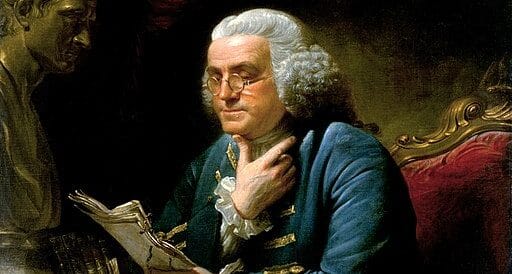
A Humble Beginning: Family and Early Struggles
Benjamin Franklin was born on January 17, 1706, in Boston, Massachusetts, into a large family. He was the fifteenth of seventeen children born to Josiah Franklin and Abiah Folger. His father was a soap and candle maker, a trade that provided a modest but meager living.
From a young age, Benjamin felt the weight of financial hardship. Josiah had dreams that his youngest son would enter the clergy, but the high cost of education soon made that impossible. Franklin attended Boston Latin School for only two years before leaving to assist in his father’s business.
Yet Franklin’s spirit was not easily confined. Though the walls of formal education closed around him, he found a doorway through books. Any book he could borrow or buy was treated like a treasure. Through reading, he traveled far beyond the narrow streets of Boston. He met philosophers, scientists, poets, and thinkers who would quietly become his lifelong companions.
Later, in his autobiography, Franklin would recall this time with gratitude. It was not school that taught him to think. It was hunger. Hunger for knowledge. Hunger for betterment.
At the age of twelve, Franklin became an apprentice to his older brother James, who owned a printing press. This apprenticeship exposed him to a broader world of ideas and opened the door to the public sphere.
By night, Franklin would secretly write essays and letters under the pseudonym “Silence Dogood,” slipping them under the door of his brother’s newspaper, The New-England Courant. These witty letters criticized social injustices and religious hypocrisy. Readers loved them. Franklin, still a boy, had found his voice.
But tensions with his brother grew. James treated him harshly, and when Franklin’s secret authorship was revealed, it caused further resentment. In search of freedom, at the age of seventeen, Franklin ran away. Alone and nearly penniless, he arrived in Philadelphia, tired, hungry, and wet from rain. Yet in his own words, he felt “hopeful.”
This moment — a boy with little money and no powerful connections stepping bravely into a new city — captures the essence of Franklin’s life. He did not wait for permission. He built his own opportunities.
A Life Devoted to Learning: Libraries and Education
Franklin’s love for learning was not selfish. He believed deeply that knowledge should be shared. In 1731, he founded the Library Company of Philadelphia, America’s first subscription library.
His idea was simple yet transformative. Instead of books being a luxury for the wealthy, they would become a shared resource. Citizens would pool their money to build collections everyone could use.
This spirit of cooperation and community improvement would echo through all Franklin’s later works. He once said, “An investment in knowledge always pays the best interest.” For Franklin, books were not just entertainment or prestige. They were tools for building a better mind and a better society.
He would go on to help found the American Philosophical Society, promote public education, and even plant the seeds for what would become the University of Pennsylvania. Each institution reflected his faith in the common person’s potential to learn, grow, and lead.
The Scientist: Curiosity Without Vanity
Many know Franklin for his famous kite experiment, where he proved that lightning was a form of electricity. But fewer realize how deeply scientific inquiry lived within him.
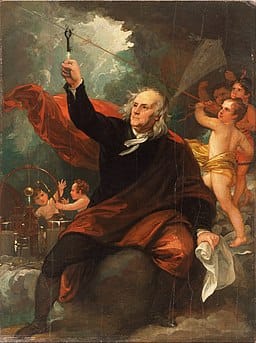
Franklin’s experiments were not driven by fame or fortune. They were born from simple wonder. He studied electricity, ocean currents, meteorology, and invented devices like the Franklin stove, bifocal glasses, and the lightning rod. He never patented his inventions. He believed that the benefits of science should belong to all.
In a world where science was still often cloaked in mystery, Franklin’s approach was radical. He showed that everyday observations could lead to great discoveries. He showed that science was not the property of kings and scholars alone. It was something every thinking, questioning person could touch.
He once wrote, “The doors of wisdom are never shut.” Franklin’s life embodied this principle. Curiosity was not just a hobby for him. It was a sacred duty.
A Statesman in the Making: Franklin’s Entry into Politics
By the mid-1700s, Franklin was a well-respected figure in Philadelphia, known for his ideas, inventions, and the print publications he had contributed to. But his sense of duty to his country, his belief in the power of governance by reason, and his deep commitment to justice eventually led him to embrace a life of public service.
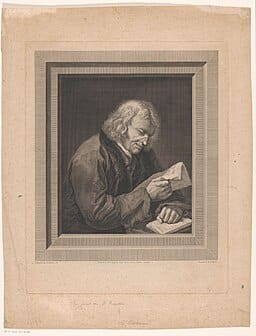
In 1757, Franklin’s political career took flight when he was appointed as Pennsylvania’s representative to the British government in London. There, he was able to advocate for the rights of the colonies, developing his understanding of political systems and diplomacy. His time in London helped him grow into the man who would later navigate the volatile waters of revolution with such remarkable grace.
It was during these years in England that Franklin’s sense of fairness and his sharp political mind truly blossomed. He became a fierce defender of colonial rights and sought a path that would allow for a harmonious relationship between Britain and the colonies. But as tensions escalated, Franklin’s once-loyalty to Britain was tested. The imposition of taxes like the Stamp Act and the Townshend Acts made it increasingly clear that reconciliation would be impossible.
Franklin’s Role in Independence
When the American colonies erupted in protest against British tyranny, Franklin was there, not as a follower but as a leader. He became a vocal and tireless advocate for independence, understanding that freedom could no longer be a hope—it had to be a reality.
In 1776, Franklin was part of the Continental Congress and played an instrumental role in drafting the Declaration of Independence. His voice was steady, his mind clear, and his resolve unwavering. Franklin knew that the declaration was not just a piece of paper; it was a call to arms, a rallying cry for an entire nation. His influence extended beyond the drafting of the document. He was also part of the crucial negotiations with France, securing vital support for the American cause.
His diplomatic brilliance came to the forefront during these years. Franklin recognized that in order to defeat the British, the colonies would need a strong international ally. He carefully navigated the complicated web of European politics, charming the French court with his wit, humility, and integrity. He not only won France’s support but also cemented his reputation as one of the most skilled diplomats in history.
While Franklin’s name is often linked to his achievements in science and diplomacy, his philosophical beliefs were no less significant. A proponent of Enlightenment ideals, Franklin held that the purpose of government was to serve the people and to create an environment where citizens could thrive in freedom and equality.
In his writings, Franklin frequently emphasized the importance of virtues like frugality, hard work, and self-discipline. Yet he also spoke passionately about the value of community, cooperation, and social responsibility. For Franklin, personal success was not an isolated achievement; it was a collective effort that could only be sustained within a just society.
He was critical of tyranny, not only in the form of oppressive rulers but also in the form of societal structures that stifled individual freedom. His belief in the power of education and civic participation was central to his vision of an ideal nation. In his mind, a well-educated citizenry was the cornerstone of democracy. Franklin’s enduring influence on American values is evident in the democratic ideals that continue to guide the country.
A Legacy of Wisdom: Franklin’s Enduring Influence
Benjamin Franklin’s life was an extraordinary journey, one that transcended the roles of scientist, inventor, diplomat, and politician. He was a man whose legacy continues to inspire and shape the way we think about leadership, knowledge, and societal progress.
As he grew older, Franklin remained deeply involved in public affairs. He continued to advocate for causes like abolition, the promotion of free speech, and the protection of civil liberties. His commitment to these ideals was unwavering, and his legacy is reflected in the institutions and ideas he helped create. From his role in founding the University of Pennsylvania to his contributions to the American Philosophical Society, Franklin’s influence on education and intellectual life in America is immeasurable.
Franklin’s life offers us a unique blend of practicality and idealism. He was not just a thinker; he was a doer. He did not wait for the world to change—he actively shaped it. In his own words, “Well done is better than well said.” And it is through his actions that we have come to recognize Franklin not just as a Founding Father, but as one of the most significant figures in American history.
Franklin’s Impact on American Society
Franklin’s influence extended to every facet of American society. His belief in the transformative power of education inspired the founding of institutions like the University of Pennsylvania. His writings, particularly Poor Richard’s Almanack, offered practical wisdom and moral guidance to readers, emphasizing values such as hard work, thrift, and humility.

Franklin’s commitment to civic improvement was evident in his efforts to establish fire departments, public hospitals, and street lighting. He believed that strong communities were built on collective responsibility and innovation.
Legacy and Death
Benjamin Franklin passed away on April 17, 1790, at the age of 84. His funeral was attended by thousands, a testament to his profound impact on both the United States and the world. Franklin’s legacy endures in the institutions he founded, the values he championed, and the innovations he introduced.
His autobiography, The Autobiography of Benjamin Franklin, remains a timeless classic. It offers insights into his philosophy, struggles, and achievements and serves as an inspiring guide for anyone seeking self-improvement and civic engagement.
Benjamin Franklin’s life was a testament to the power of curiosity, perseverance, and service to others. From his humble beginnings as a printer’s apprentice to his role as a statesman, inventor, and philosopher, Franklin’s journey exemplifies the American ideal of self-made success. His devotion to reading, writing, and education not only transformed his life but also left an indelible mark on American society.
Through his inventions, political achievements, and dedication to the public good, Franklin helped shape the United States into a nation grounded in liberty, knowledge, and innovation. His words and deeds continue to inspire generations, reminding us that a commitment to learning and service can lead to extraordinary accomplishments.
The Quiet Architect: Lessons from Franklin’s Life
Benjamin Franklin’s life teaches us many lessons, not the least of which is the power of resilience. Despite his early hardships, he rose to become a symbol of what self-education, hard work, and a dedication to the greater good can achieve. His story shows that greatness is not merely the result of talent, but of persistence and a willingness to embrace learning at every stage of life.
Furthermore, Franklin’s approach to life was always rooted in service. He never sought recognition for his inventions or his diplomatic feats. His joy came from knowing that his work helped others. His life encourages us to ask ourselves: Are we using our talents and knowledge to make a meaningful impact on the world around us?
Benjamin Franklin’s wisdom resonates through time, reminding us that the power to change the world lies not in wealth or power, but in the pursuit of knowledge, virtue, and service to others. As we move forward in our own lives, Franklin’s example is a beacon, guiding us to live lives that are not only successful but deeply meaningful.
Franklin’s life was full of curiosity, courage, and big ideas—but his story doesn’t stop there. If you’ve ever wondered why he’s on U.S. currency, it’s because what he gave to America—and the world—still matters. In our next post, we look at the legacy he left behind. It’s worth exploring.
Read here: Why Benjamin Franklin is on US Currency?

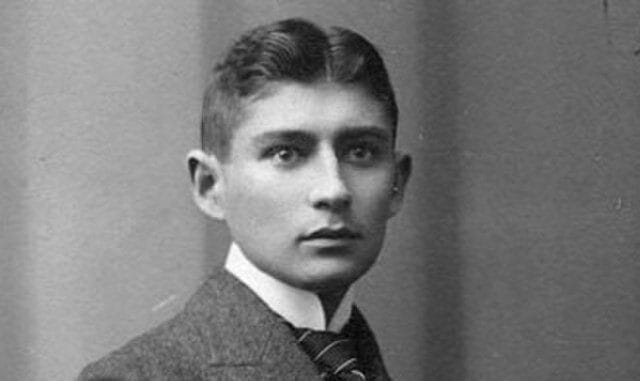
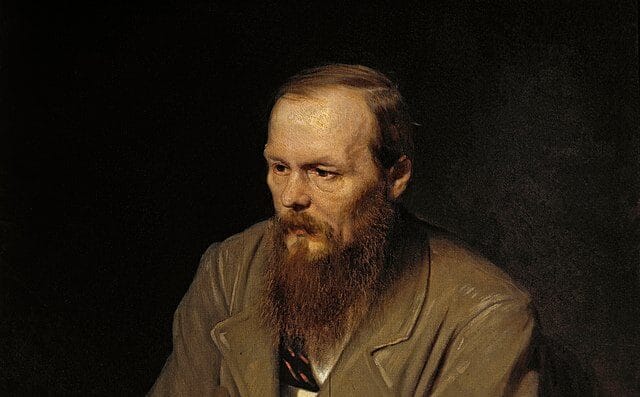
As I website possessor I believe the written content here is real good, thanks for your efforts.
Unquestionably believe that which you said. Your favorite justification appeared to be on the web the easiest thing to be aware of. I say to you, I certainly get annoyed while people think about worries that they plainly do not know about. You managed to hit the nail upon the top and defined out the whole thing without having side-effects , people could take a signal. Will probably be back to get more. Thanks
I am not sure where you’re getting your info, but great topic. I needs to spend some time learning more or understanding more. Thanks for great information I was looking for this info for my mission.